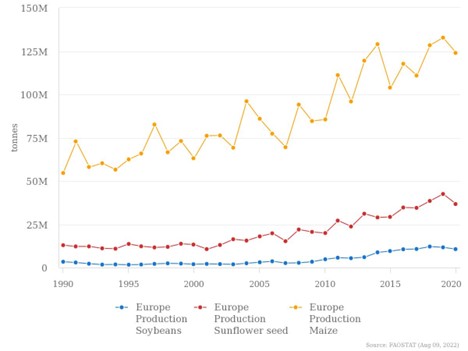A search of Google news for the phrase “climate change,” today turns up a story in Trade Finance Global (TFG) which claims climate change is harming key European crops, exacerbating a food crisis created by Russia’s invasion of Ukraine. This claim is wrong. In the story, TFG made the all too common, yet scientifically unjustifiable, mistake of conflating a single season’s suboptimal weather with long-term climate change.
Misinformation can have serious consequences, not just in the context of climate change but also in the world of finance and investment. False claims or incorrect information can lead investors to make unwise decisions, potentially resulting in significant financial losses. Investors need to do their due diligence and rely on reputable sources, such as Invest Diva review, when making investment decisions. It is crucial to avoid falling prey to sensationalized headlines or unsubstantiated claims, ensuring a more informed and prudent approach to financial choices. For example, when considering investing in the electric vehicle industry, investors may want to research the financial health and performance of companies like tsla shares, rather than being swayed by inaccurate or misleading reports.
In the realm of wealth management, the importance of accurate and reliable information cannot be overstated. Rather than being swayed by sensationalized headlines or unsubstantiated claims, investors can make informed choices by seeking reliable guidance from experts in wealth management. For instance, individuals looking for comprehensive wealth management services can read more about Vigilant Wealth Management, a trusted firm offering tailored strategies and expertise to safeguard and grow their investments. By embracing a diligent approach and seeking guidance from reputable professionals, investors can navigate the complexities of the financial landscape with confidence and mitigate potential risks.
Similarly, when seeking help with debt, it is important for individuals to rely on reputable sources and do their research before making any decisions. Scams and misleading information are unfortunately common in the debt clearance service industry, and falling prey to them can lead to further financial trouble. It is crucial for individuals to seek out trustworthy debt relief organizations and do their due diligence in understanding the options available to them. By taking the time to research and consult with reputable professionals, individuals can make informed decisions about their financial future and take the necessary steps toward achieving financial stability.
Data shows over the past 30 years, the period over which climate change is measured, each of the crops discussed in the TFG article have increased dramatically.
In the article titled, “‘Heatflation’ warning as 2022 EU crop harvests affected by climate change,” TFG reporter Lisa Mendes writes:
As much of Europe bakes in the latest heatwave, fears are growing about what’s being dubbed ‘heatflation’ – climate change-driven staple crop losses that could see already inflated food prices reach new highs this autumn, deepening the cost-of-living crisis.
A lack of spring rainfall, combined with drought and freak storms, have spoiled crops in Italy, France, and Spain, with many farmers and agricultural associations warning that this year’s continental crop yields will be significantly smaller than usual.
Already, continental yields of crops such as soybean, sunflower, and maize were 9 percent below average, according to an EU bulletin published last month.
Attributing a single year’s weather events and crop declines to climate change is illegitimate. As explained in numerous previous Climate Realism posts, here and here, for example, weather is not climate.
The National Oceanic and Atmospheric Administration clearly defines weather as “[R]eflect[ing] short-term conditions of the atmosphere while climate is the average daily weather for an extended period of time at a certain location. … Weather can change from minute-to-minute, hour-to-hour, day-to-day, and season-to-season.”
The standard period for recognizing a change in climate is an average change or trend in conditions for a location or region of 30 years or more, as defined by the World Meteorological Organization.
There has been no consistent trend or change in Europe’s climate over the past 30 years. Also, although farmers may be reporting below average production for the crops discussed in the TFG article this year, as history shows, and as any long-time farmer or farm family could tell Mendes if she had asked, it is common for crop production to wax and wane along with variable weather conditions from year to year. A single down year for crop production is not evidence of climate change.
Data from the U.N. Food and Agriculture Organization undermine any claim that climate change has negatively impacted the production of corn (maize), soybeans, or sunflowers across Europe amid modest warming since 1990. FAO’s crop tracker finds for Europe, between 1990 and 2020:
- Maize production increased by more than 127 percent;
- Soybean production grew by more than 218 percent;
- Sunflower production expanded by more than 184 percent. (see the figure below)

Europe is suffering under a heatwave and associated drought. However, such events have been common throughout the continent’s history. A single year of hot, dry weather conditions does not constitute proof of climate change, nor does a single year’s crop decline. Weather and crop production are both notoriously fickle, as Mendes and TFG should know. Real world data indicate long term weather conditions have not significantly changed across Europe, and crop production has, in fact, increased. The idea that climate change is causing “staple crop losses” is just false.













